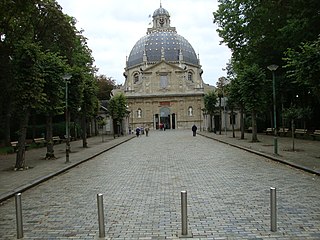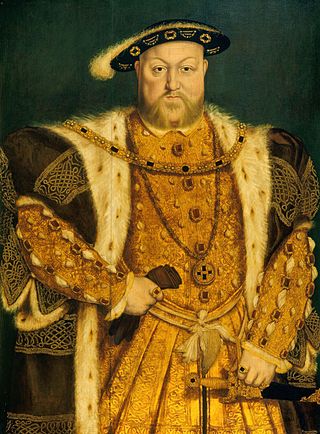Related Research Articles

Scherpenheuvel-Zichem is a city and municipality located in the province of Flemish Brabant, Flemish Region, Belgium, encompassing the towns of Averbode, Messelbroek, Okselaar, Scherpenheuvel, Schoonderbuken, Keiberg, Kaggevinne, Testelt and Zichem. On January 1, 2020, Scherpenheuvel-Zichem had a total population of 23,135. The total area is 50.50km2 which gives a population density of 458.1 inhabitants per km2.

Heinrich Bullinger was a Swiss Reformer and theologian, the successor of Huldrych Zwingli as head of the Church of Zürich and a pastor at the Grossmünster. One of the most important leaders of the Swiss Reformation, Bullinger co-authored the Helvetic Confessions and collaborated with John Calvin to work out a Reformed doctrine of the Lord's Supper.

Nicholas Ridley was an English Bishop of London. Ridley was one of the Oxford Martyrs burned at the stake during the Marian Persecutions, for his teachings and his support of Lady Jane Grey. He is remembered with a commemoration in the calendar of saints in some parts of the Anglican Communion on 16 October.

John Roy Hooper was an English churchman, Anglican Bishop of Gloucester, later of Worcester and Gloucester, a Protestant reformer and a Protestant martyr. A proponent of the English Reformation, he was executed for heresy by burning during the reign of Queen Mary I.

Rowland Taylor was an English Protestant martyr during the Marian Persecutions.

The Protestant Reformation in Switzerland was promoted initially by Huldrych Zwingli, who gained the support of the magistrate, Mark Reust, and the population of Zürich in the 1520s. It led to significant changes in civil life and state matters in Zürich and spread to several other cantons of the Old Swiss Confederacy. Seven cantons remained Catholic, however, which led to intercantonal wars known as the Wars of Kappel. After the victory of the Catholic cantons in 1531, they proceeded to institute Counter-Reformation policies in some regions. The schism and distrust between the Catholic and the Protestant cantons defined their interior politics and paralysed any common foreign policy until well into the 18th century.

The Marian exiles were English Protestants who fled to continental Europe during the 1553–1558 reign of the Catholic monarchs Queen Mary I and King Philip. They settled chiefly in Protestant countries such as the Netherlands, Switzerland and Germany, and also in France, Italy and Poland.
Margaret Elter, or Marguerite d'Elter, was a noblewoman from Guelders, relative of Anna 't Serclaes, and Protestant refugee in Cambridge and Strasbourg.

Blackfriars, Gloucester, England, founded about 1239, is one of the most complete surviving Dominican black friaries in England. Now owned by English Heritage and restored in 1960, it is currently leased to Gloucester City Council and used for weddings, concerts, exhibitions, guided tours, filming, educational events and private hires. The former church, since converted into a house, is a Grade I listed building.

The Protestant Reformation during the 16th century in Europe almost entirely rejected the existing tradition of Catholic art, and very often destroyed as much of it as it could reach. A new artistic tradition developed, producing far smaller quantities of art that followed Protestant agendas and diverged drastically from the southern European tradition and the humanist art produced during the High Renaissance. The Lutheran churches, as they developed, accepted a limited role for larger works of art in churches, and also encouraged prints and book illustrations. Calvinists remained steadfastly opposed to art in churches, and suspicious of small printed images of religious subjects, though generally fully accepting secular images in their homes.
Guido de Bres was a Walloon pastor, Protestant reformer and theologian, a student of John Calvin and Theodore Beza in Geneva. He was born in Mons, County of Hainaut, Southern Netherlands, and was executed at Valenciennes. De Bres compiled and published the Walloon Confession of Faith known as the Belgic Confession (1561) still in use today in Belgium and the Netherlands. It is also used by many Reformed Churches all over the world.
Events from the 1550s in England. This decade marks the beginning of the Elizabethan era.

The English Reformation took place in 16th-century England when the Church of England broke away first from the authority of the Pope and bishops over the King and then from some doctrines and practices of the Catholic Church. These events were part of the wider European Reformation: various religious and political movements that affected both the practice of Christianity in Western and Central Europe and relations between church and state.

The reign of Elizabeth I of England, from 1558 to 1603, saw the start of the Puritan movement in England, its clash with the authorities of the Church of England, and its temporarily effective suppression as a political movement in the 1590s by judicial means. This led to the further alienation of Anglicans and Puritans from one another in the 17th century during the reigns of King James and King Charles I, that eventually brought about the English Civil War, the brief rule of the Puritan Lord Protector of England Oliver Cromwell, the English Commonwealth, and as a result the political, religious, and civil liberty that is celebrated today in all English speaking countries.

Celio Secondo Curione was an Italian humanist, grammarian, editor and historian, who exercised a considerable influence upon the Italian Reformation. A teacher in Humanities, university professor and preceptor to the nobility, he had a lively and colourful career, moving frequently between states to avoid denunciation and imprisonment: he was successively at Turin, Milan, Pavia, Venice and Lucca, before becoming a religious exile in Switzerland, first at Lausanne and finally at Basel, where he settled. He was famous and admired as a publisher and editor of works of theology and history, also for his own writings and teachings, and for the wide sphere of his friendships and correspondence with many of the most interesting reformists, Protestants and heretics of his time, though his energetic influence was at times disruptive. The imputation of antitrinitarianism is very doubtful. Curio published under the Latin form of his name, but scholarship has adopted the Italian form.
The Reformation in Ireland was a movement for the reform of religious life and institutions that was introduced into Ireland by the English administration at the behest of King Henry VIII of England. His desire for an annulment of his marriage was known as the King's Great Matter. Ultimately Pope Clement VII refused the petition; consequently, in order to give legal effect to his wishes, it became necessary for the King to assert his lordship over the Catholic Church in his realm. In passing the Acts of Supremacy in 1534, the English Parliament confirmed the King's supremacy over the Church in the Kingdom of England. This challenge to Papal supremacy resulted in a breach with the Catholic Church. By 1541, the Irish Parliament had agreed to the change in status of the country from that of a Lordship to that of Kingdom of Ireland.
Valérand Poullain (1509?–1557) was a French Calvinist minister. In a troubled career as minister, he was pastor to a congregation of Flemish or Walloon weavers brought to Southwest England around 1548.
The Channel Islands Witch Trials were a series of witch trials in the Channel Islands of Jersey and Guernsey between 1562 and 1661.
Joan or Jane Wilkinson (d.1556) was silkwoman to Anne Boleyn and Lady Lisle and a Protestant reformer. She was a friend of other leading reformers, including Bishops John Hooper and Hugh Latimer. During the reign of Mary I, she became a religious exile, and died at Frankfurt in 1556.
Rose Lok was an English businesswoman and Protestant exile during the Tudor period. At the age of eighty-four, she wrote an account covering the first part of her life.
References
- 1 2 3 Ben Lowe (2 March 2017). Commonwealth and the English Reformation: Protestantism and the Politics of Religious Change in the Gloucester Vale, 1483–1560. Routledge. pp. 297–. ISBN 978-1-351-95038-1.
- 1 2 3 J. Chappell; K. Kramer (19 November 2014). Women during the English Reformations: Renegotiating Gender and Religious Identity. Springer. pp. 47–48. ISBN 978-1-137-46567-2.
- ↑ Carole Levin; Anna Riehl Bertolet; Jo Eldridge Carney (3 November 2016). A Biographical Encyclopedia of Early Modern Englishwomen: Exemplary Lives and Memorable Acts, 1500-1650. Taylor & Francis. pp. 68–. ISBN 978-1-315-44071-2.
- ↑ Rachel Basch, 'Hooper, Anne (d. 1555)', Oxford Dictionary of National Biography, Oxford University Press, April 2016 accessed 7 June 2017